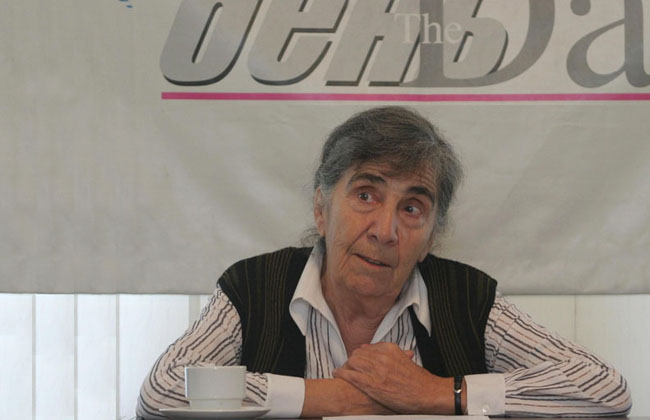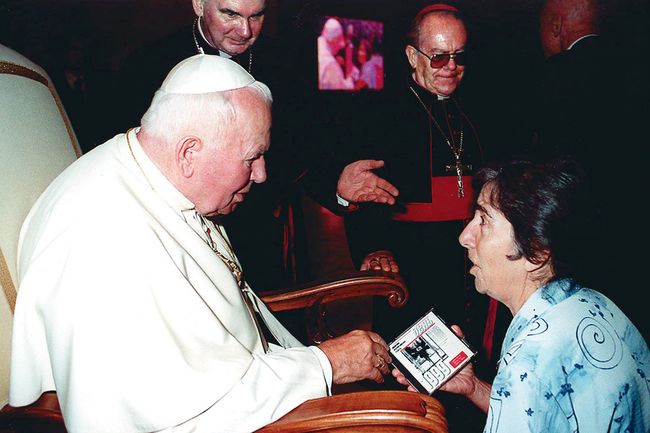Moral instructions of Klara Gudzyk
She would have been 85 on September 10, 2015
In today’s world it is not too fashionable to be spiritual and religious. Taking into account the European countries, for example, one can hear less and less appeals for a priestly or religious life. After the events in France for many people the perished Charlie Hebdo journalists are heroes, who died for the freedom of speech – and only few perceive the magazine’s editorial policy as one that offends their personal spiritual feelings. Religion is still an unprofitable topic that generates little viewer rating for many secular media. Often the Church is perceived only through some sensational events, scandals, and conflicts; when something good happens, this subject is usually not a priority in news blocks. Klara Gudzyk has seen the religious environment in a profound way, without tabloidness and vulgarization, as she addresses the problem of concentration on the positive trends that are often out of picture for the secular media. Her texts – now assembled into a separate book in the Den’s Library series, Klara Gudzyk’s Apocrypha, are not only skillfully and professionally written; they are interesting for thinking people, as they constitute a separate University of the open heart for every reader. In these texts one can find words of support, advice, and reassurance. They also provide a special “lecture space” – with seminars for both the journalists who write about religion and for those readers who care about these issues. September 10, 2015 marks 85 years since Gudzyk’s birth. On the eve of this anniversary I decided to reflect on the basic ideas of her “lectures” with the moral teachings for modern journalism.
Be open to others! Over the past two years the difficult and tragic events in our country have helped us realize the value of unity. We, Ukrainians, in every political era had always been urged to divide. In addition to territorial and socio-political divisions of today, there are many schemes aimed at the spiritual separation of Ukrainian people. Reading Gudzyk’s texts, we understand that despite their wide denominational spectrum, none of them expresses any aggression, dislike or hostility towards any denomination. Gudzyk is a Catholic to the Catholics and an Orthodox to the Orthodox. This, in my opinion, is a quality religious journalism – unbiased towards any confession or denomination, but giving everyone the opportunity to speak. The task of the religious journalist is to connect people, to build a platform for dialog, to create understanding, to destroy their own stereotypes, and sometimes to go beyond their scope and see the world through the others’ eyes.
Respect others from great love for one’s own! In her memoirs of an audience with Pope John Paul II, Gudzyk wrote: “Taking the opportunity, I handed the pope a set of compact disks with the electronic version of the Den’s Library. At first I was addressing the Pope in Polish, but as soon as he found out where I came from, he switched to Ukrainian.” And this prompted me to reflect on how often journalists lose themselves in going for foreign trends, in the pursuit of a fashionable hangout. The example of Gudzyk, in my opinion, demonstrates the basic concept for a journalist – have a core of your own, but be open to different worldviews. Why did John Paul II switch to Ukrainian? I think he did it because he saw the true love for Ukrainian, which opened the horizons of his being Polish.

VATICAN, JULY 10, 2000. DEN’S JOURNALIST KLARA GUDZYK HANDS A SET OF COMPACT DISCS, THE ELECTRONIC VERSION OF DEN’S LIBRARY, TO POPE JOHN PAUL II / Photo from The Day’s archives
Be a person with an open mind! In my opinion, journalistic text is only productive when an author is close to a reader. The texts of Klara Gudzyk are not only saturated intellectually – they are a kind of mini-sermons, in which everyone may find something close to their soul. The journalist tried to be a counselor to her audience, sometimes a critic – but between the acute words one can feel her enormous love to the reader. Gudzyk’s articles demonstrate the world’s perception primarily through its spiritual core. For even a smallest sudden joy or smile is a hundred times more valuable than any gold ingot.
Do not be afraid! Klara Gudzyk used to repeat this phrase, which belongs to Blessed John Paul II, a lot in her cycle of articles about the Pope’s visit to Ukraine – as she adhered to the same principle in her own life. In the introduction to her book Klara Gudzyk’s Apocrypha she writes about journalism, how alien and distant it seemed to her in the beginning. But she was not afraid to change her life, to open the new opportunities. Even after the Soviet Union’s collapse, many journalists held on to the Soviet mode of thinking in their hearts, in their minds, and in their texts. This was the courage of Klara Gudzyk – firstly, to depart from an established standard and produce something new; and secondly, to demonstrate the mentality of a post-genocidal society that still retained its spiritual mentality.
For me personally, the most striking argument in support of this hypothesis is the events of November 30, 2013, when the beaten students from Maidan sought shelter in St. Michael’s Monastery. Ukrainians are a nation with a deep foundation of spirituality, with a unique and majestic history of the Christianity establishment – a history which has constantly been stolen from us and rewritten. We should reject the fashionable trends and stay ourselves. We should take Klara Gudzyk as an example, with her courage to find beauty in journalism no matter what, with her courage of not isolating this beauty, but propagating it – as only the spiritual is real!
Newspaper output №:
№50, (2015)Section
Society





